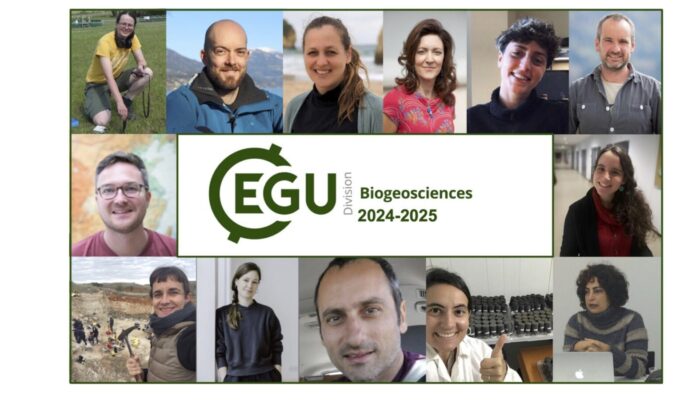
The Biogeoscience division team has changed over the last year, and in this blog post, we are delighted to introduce our new team of representatives and describe their roles and research interests so that you can get to know them better. Our division is led by a President and Deputy President, supported by two Early Career Scientist Representatives and several sub-division officers who cover various aspects of biogeosciences. We are also excited to introduce our new Policy Officer and the OSPP coordinators.
President: Lisa Wingate
Lisa (she/her) has been the president of the BG division since 2020 and has been elected to serve until 2025. She works as a researcher for INRAE in Bordeaux, France. She has a passion for the natural world and has conducted research on how plants and soil microbes influence atmospheric chemistry. Additionally, she investigates how feedbacks between atmospheric chemistry and climate will impact biosphere functions using a range of tools and at different scales. Lisa is also an active member of the EGU Equality, Diversity & Inclusivity Committee. You can follow her on X: @LisaWingateBdx.
Deputy President: Robyn Pickering
Robyn (she/her) is a Senior Lecturer in the Department of Geological Sciences at the University of Cape Town, South Africa, where she leads the Quaternary Terrestrial Ecosystems group and co-directs the Human Evolution Research Institute. Her research focuses on terrestrial carbonates associated with early human occupation sites in southern Africa. She also incorporates uranium series chronology, trace element geochemistry, speleothem petrology and diagenesis, palaeolimnology, southern hemisphere palaeoclimates, and landscape evolution in her work. Additionally, Robyn is dedicated to decolonizing geosciences, actively redressing issues for African scholars, and raising awareness about neo-colonialism in research practices. You can follow her on X: @PickeringRobyn.
ECS Reps: Elsa Abs and Sílvia Poblador
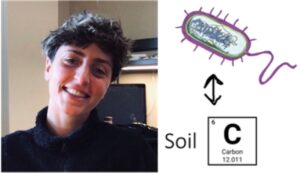
Elsa (they/them) is a Postdoctoral Marie Curie Fellow at the Laboratory for Sciences of Climate and Environment (LSCE) near Paris. They are interested in the interaction between Darwinian evolution and climate science, studying how soil microbes evolve with climate change and how their evolution modifies the global carbon cycle. Elsa is also the co-founder of the early career branch of the Ethics Reflection Group at the Institute Pierre-Simon Laplace (ISPL), which organizes seminars on the ethics of scientists’ engagement for climate. Additionally, they co-created a queer group at their institute. You can follow them on X: @ElsaHAbs.
Sílvia Poblador (she/her) is a Postdoctoral researcher in the Department of Evolutionary Biology, Ecology, and Environmental Sciences at the University of Barcelo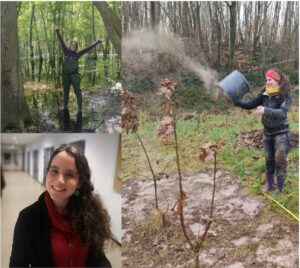 na, working on the ALFAwetlands Project (Horizon Europe). Her research focuses on soil carbon and nitrogen biogeochemistry, associated microbial activity, and greenhouse gas emissions from wetlands. She also investigates enhanced weathering processes to increase soil carbon sequestration and reduce N2O emissions from agricultural soils. Sílvia is an advocate for Women in Science and is part of the Gender&Science AIL Group and the Diversity and Inclusion in the Scientific Community (SIBECOL). You can follow her on X: @SilPoblador and @GenderAil.
na, working on the ALFAwetlands Project (Horizon Europe). Her research focuses on soil carbon and nitrogen biogeochemistry, associated microbial activity, and greenhouse gas emissions from wetlands. She also investigates enhanced weathering processes to increase soil carbon sequestration and reduce N2O emissions from agricultural soils. Sílvia is an advocate for Women in Science and is part of the Gender&Science AIL Group and the Diversity and Inclusion in the Scientific Community (SIBECOL). You can follow her on X: @SilPoblador and @GenderAil.
Read more about our ECS reps here!
Blog Chief Editor: Lucia S. Layritz
Lucia (she/her) is a PhD student at the Technical University of Munich and will start a postdoctoral position at the Schmidt Center for Data Science & Environment at the University of California, Berkeley, USA, in October 2024. She researches ecosystem recovery processes, both with dynamic vegetation models and remote sensing and is also interested in land surface – atmosphere interactions and stochastic modelling more broadly. Lucia is passionate about data visualization and science communication. As a skilled amateur scientific illustrator, she designed our beautiful division logo and is the new Editor-in-Chief of the division blog. You can follow her on X: @lucialayr.
Sub-division officers: Our sub-division officers represent the various themes within the BG division. You can contact them about blog posts or campfire events related to their topics or for new General Assembly session proposals within their themes.
Biogeosciences Policy & Society: Elias Symeonakis
Elias (he/him) is an Associate Professor in Earth Observation and GIS at Manchester Metropolitan University, UK, where he leads the Remote Sensing Group. Elias participated in the EGU/European Parliament Science-Policy Pairing Scheme in 2022 and is the lead author of UNEP’s ongoing 7th Global Environment Outlook report. His research interests focus on using satellites and drones for vegetation monitoring in drylands and savannah environments, with a particular emphasis on land degradation. He is the BG division’s point of contact for policy. You can follow him on X: @EliasSymeonakis.
Geomicrobiomes & Function: Christoph Keuschnig
Christoph (he/him) is a Postdoctoral Fellow in the Interface Geochemistry Section of the German Research Centr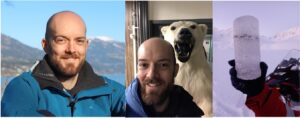 e for Geosciences (GFZ) in Potsdam, specializing in environmental metagenomics. His research interests include microbiome function in Arctic ecosystems and the impact of fungal-bacterial interactions on biogeochemical processes in soil, utilizing next-generation sequencing techniques and bioinformatics. You can follow him on X: @KeuschnigC.
e for Geosciences (GFZ) in Potsdam, specializing in environmental metagenomics. His research interests include microbiome function in Arctic ecosystems and the impact of fungal-bacterial interactions on biogeochemical processes in soil, utilizing next-generation sequencing techniques and bioinformatics. You can follow him on X: @KeuschnigC.
Marine Biogeosciences: Sinikka Lennartz and Marie Arnaud
Sinikka (she/her) is a Junior Professor at the Institute for Chemistry and Biology of the Marine En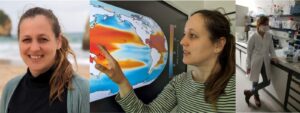 vironment at the University of Oldenburg, Germany, where she leads the Biogeochemical Ocean Modelling group. Her research focuses on global biogeochemical cycles in the ocean and their role in the climate system, microbial community interactions and their impact on elemental cycles, and the air-sea exchange of climate-relevant trace gases, especially sulfur gases like carbonyl sulfide and carbon disulfide.
vironment at the University of Oldenburg, Germany, where she leads the Biogeochemical Ocean Modelling group. Her research focuses on global biogeochemical cycles in the ocean and their role in the climate system, microbial community interactions and their impact on elemental cycles, and the air-sea exchange of climate-relevant trace gases, especially sulfur gases like carbonyl sulfide and carbon disulfide.
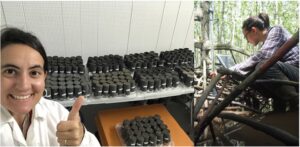
Marie (she/her) is a Marie Curie Postdoctoral Fellow at the Institute of Ecology and Evolution of Paris at Sorbonne University. She is also an associate researcher at the University of Birmingham. Her research interests include Blue Carbon ecosystems (mangroves and saltmarshes), organic matter, particularly in the context of global changes, and root-soil interactions across ecosystems. Marie is an advocate for women in science and anti-colonial science. You can follow her on X: @M_ecohydro.
Terrestrial Biogeosciences: Steffen Seitz and Bikem Ekberzade
Steffen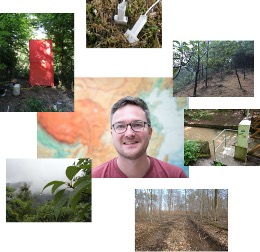 (he/him) is a Senior Scientist in soil science and geomorphology at the University of Tübingen, Germany, where he leads the Vegetation and Erosion group. He is also a JSPS Research Fellow at the FFPRI Forestry Institute in Japan and holds a visiting researcher position at the School of Forestry, Northern Arizona University, USA. His research interests span vegetation and soil erosion, with a focus on biogeomorphology, ecohydrology, ecosystem functioning, and methodology in erosion research. You can follow him on X: @seitz_steffen.
(he/him) is a Senior Scientist in soil science and geomorphology at the University of Tübingen, Germany, where he leads the Vegetation and Erosion group. He is also a JSPS Research Fellow at the FFPRI Forestry Institute in Japan and holds a visiting researcher position at the School of Forestry, Northern Arizona University, USA. His research interests span vegetation and soil erosion, with a focus on biogeomorphology, ecohydrology, ecosystem functioning, and methodology in erosion research. You can follow him on X: @seitz_steffen.
Bikem (she/her) is a Postdoctoral Researcher in the Eurasia Institute of Earth Sciences, Geohazards at Istanbul Technical University, Turkey, since April. She is also a radio producer with a previous career in photojournalism and conflict reporting. Bikem’s research interests include climate change i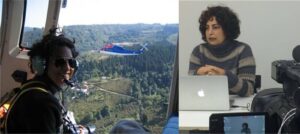 mpacts on biodiversity and terrestrial ecosystems, particularly forest monitoring, modeling, geohazards, disturbance ecology, remote sensing, and land use. You can follow her on X: @Bikem71.
mpacts on biodiversity and terrestrial ecosystems, particularly forest monitoring, modeling, geohazards, disturbance ecology, remote sensing, and land use. You can follow her on X: @Bikem71.
BG OSPP co-ordinators: Albin Hammerle and Carolyn-Monika Görres
Albin (he/him) is a Senior Postdoctoral Researcher at the Institute of Ecology, Universität Innsbruck, Austria. His research focuses on ecosystem modeling, trace gas exchange in terrestrial ecosystems, remote and proximal sensing, and ecophysiology. You can follow him on X: @AlbinHammerle.
Carolyn-Monika (she/her) is a Scientist at the Institute of Applied Ecology at Geisenheim University, Germany. Her research interests include greenhouse gas fluxes in terrestrial ecosystems, acoustic monitoring of soil biodiversity, stable carbon isotopes in GHG flux research, and the role of soil fauna in soil GHG fluxes. You can follow her on X: @CarolynGorres.
Edited by Elsa Abs

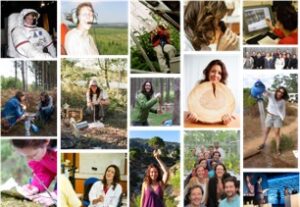
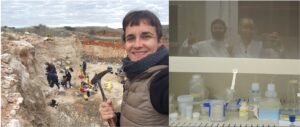
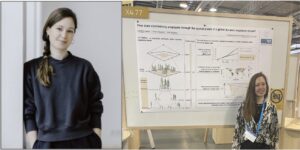
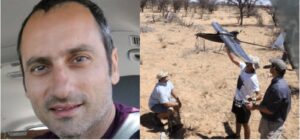
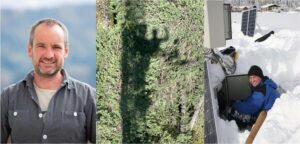
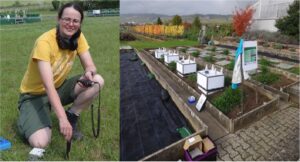
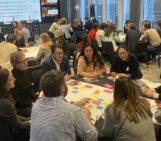
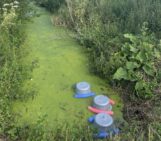

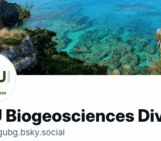
Lucia Layritz
🎉 🎉 🎉